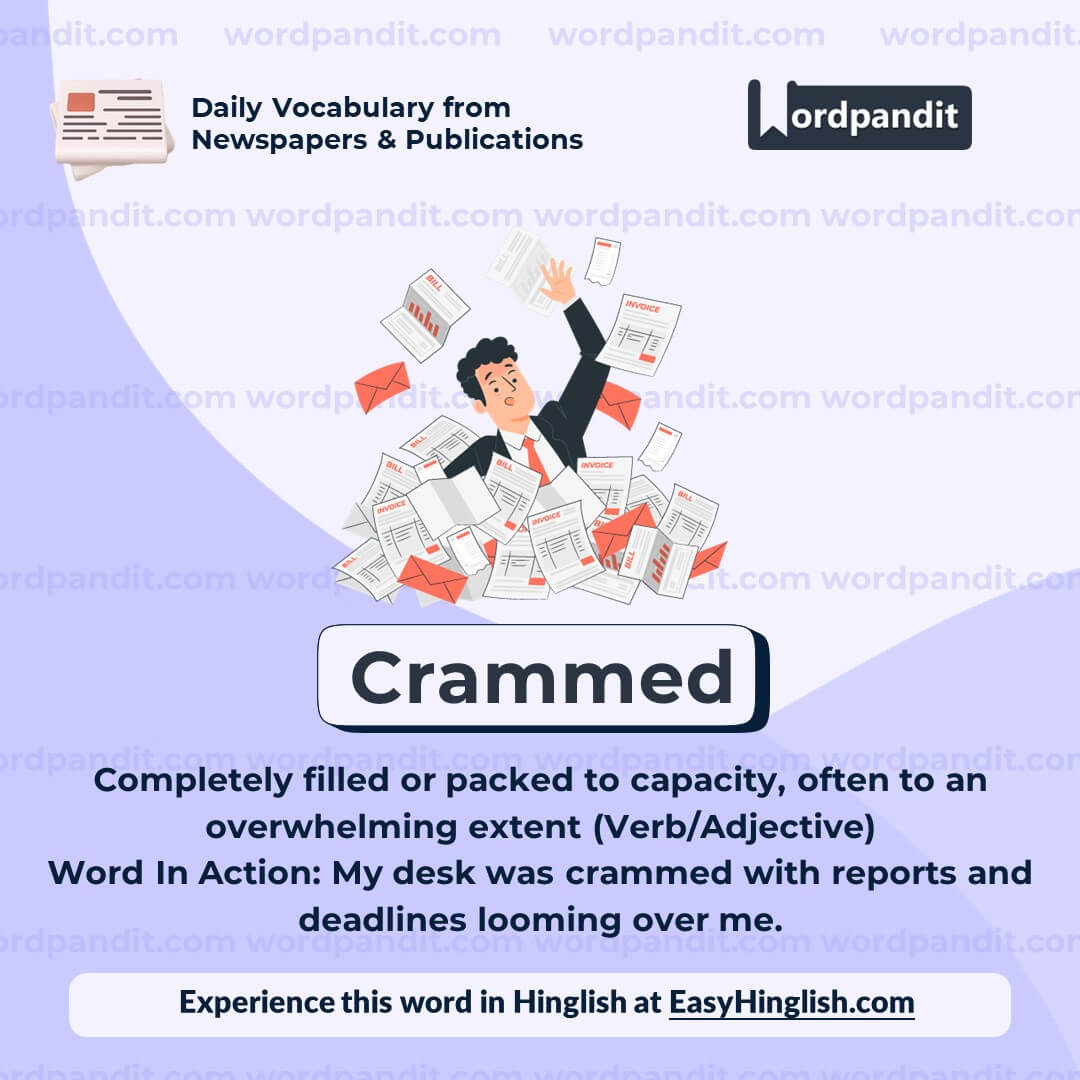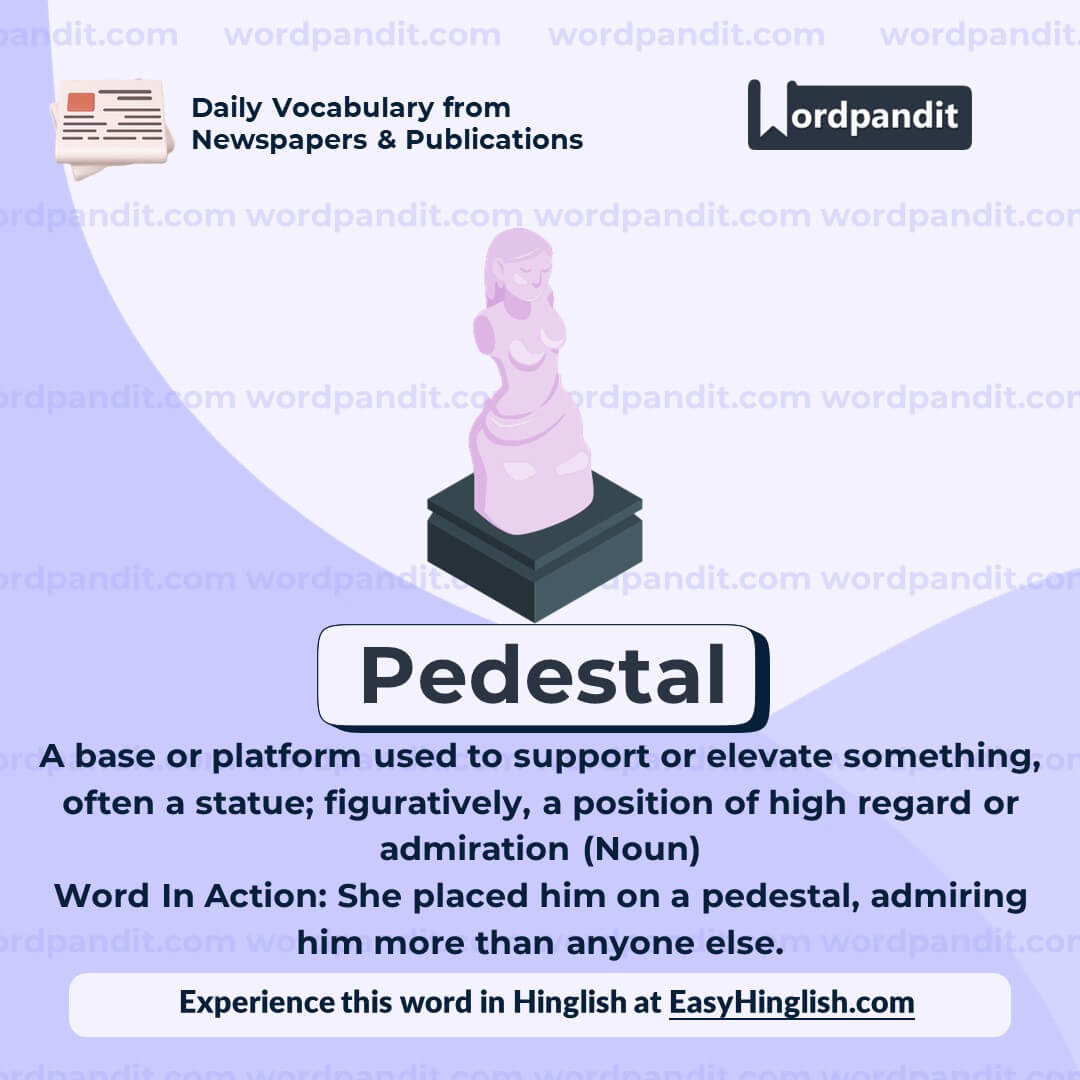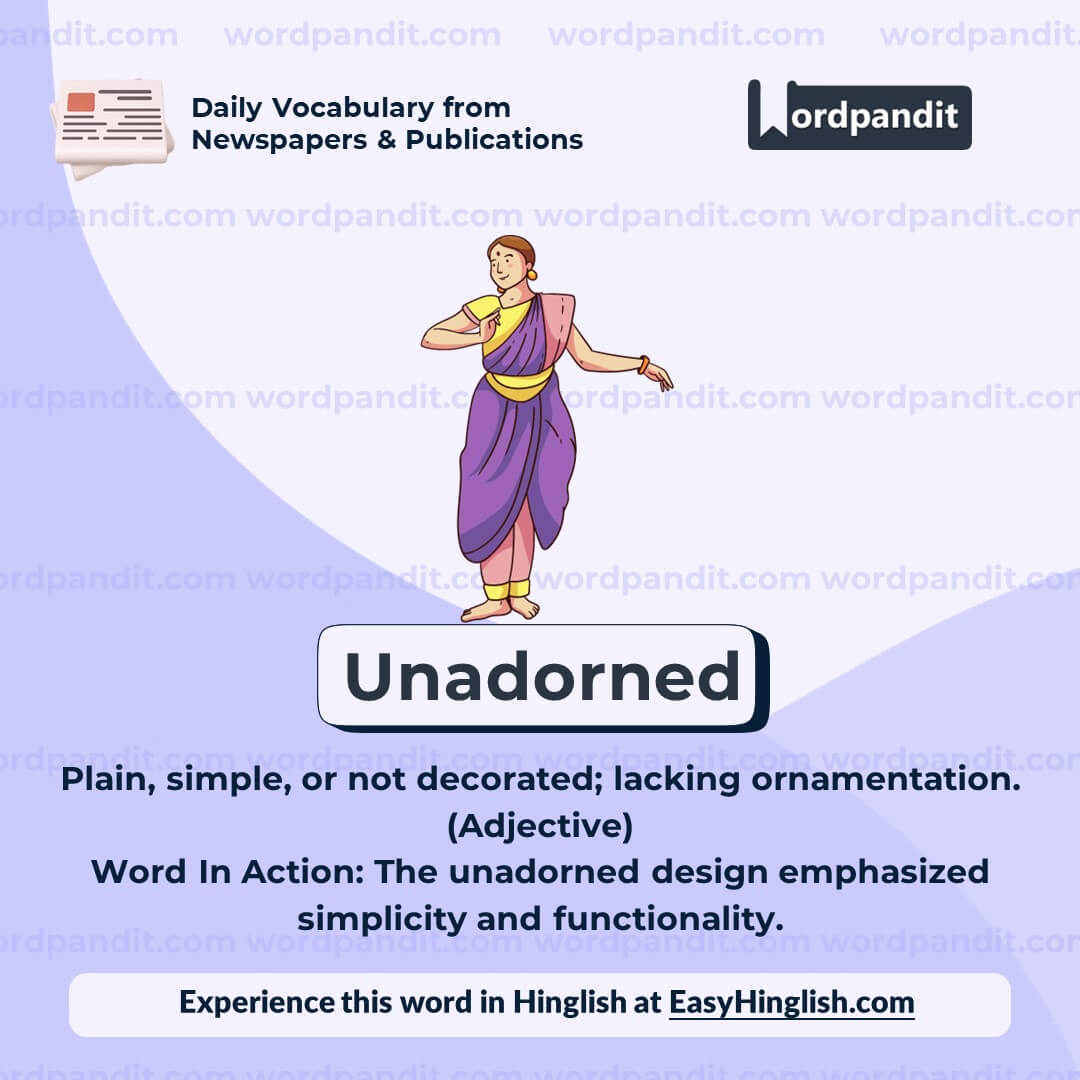Daily Vocabulary from International Newspapers and Publications
Expand Your Vocabulary with Wordpandit’s Global Vocabulary Hub
At Wordpandit, we are committed to helping you develop a truly global vocabulary by drawing from some of the most respected international publications. This section is designed to keep you ahead of the curve by introducing you to words that define global conversations and trends.
The Power of Global Sources
To help you think and communicate on a global scale, we curate vocabulary from renowned international sources, such as:
- The New York Times
- The Washington Post
- BBC
- The Guardian
- The Economist
- Scientific American
- Psychology Today
- And many more...
Stay Global, Stay Competitive
Our daily updates from international publications ensure you are consistently exposed to new words that reflect global news and developments, making sure your vocabulary is not only current but also globally relevant.
Enhance Your Global Perspective
Whether you’re preparing for international exams, aiming to excel in global business communication, or want to enhance your language skills for personal growth, Wordpandit offers the resources you need to thrive in a global context.
Effective Learning, Global Reach
Our learning methodology combines global examples, memory aids, and interactive activities, allowing you to internalize new words effectively and apply them in real-world scenarios.
Begin Your Global Vocabulary Journey Now!
Why Choose Wordpandit?
Practical Learning: Focus on words you'll actually encounter in real-world reading, enhancing your comprehension and communication skills.
Diverse Content: From current affairs to scientific breakthroughs, our varied sources expose you to vocabulary across multiple domains.
Effortless Integration: Make Wordpandit a part of your daily routine. Just a few minutes each day can significantly boost your lexicon over time.
Your Path to Vocabulary Mastery
- Visit our Daily Vocabulary section regularly
- Explore new words and their usage in context
- Practice incorporating these words into your own writing and speech
- Track your progress as your vocabulary expands
Start Your Journey Today
Embark on your vocabulary enhancement journey with Wordpandit. By consistently engaging with our daily posts, you'll build a robust vocabulary that serves you well in academic, professional, and personal contexts.
Remember, a word a day keeps linguistic limitations at bay. Make Wordpandit your daily companion in the quest for vocabulary excellence!
WORD-1: Crammed
Context:
"Lifestyles are a lot more ordinary,’ he explained. ‘We live in cozy wood-framed apartments or mini-condos crammed to the gills with things.’" - Aeon
Explanatory Paragraph:
The word "crammed" refers to something being packed tightly or filled beyond capacity, often in a way that leaves little to no room for anything else. It conveys a sense of overcrowding or being stuffed to the brim.
Meaning: Completely filled or packed to capacity, often to an overwhelming extent. (Verb/Adjective)
Pronunciation: kramd
Difficulty Level: ⭐⭐ Beginner
Etymology: Derived from Middle English "crammen," meaning "to stuff or crowd," which has origins in Old English "crammian."
Synonyms & Antonyms:
Synonyms: packed, stuffed, jammed, overcrowded
Antonyms: spacious, roomy, sparse, empty
Usage Examples:
- The subway was crammed with commuters during rush hour.
- Her bag was crammed with books, snacks, and supplies for the trip.
- We crammed into the tiny car, laughing at how squished we were.
- The lecture hall was crammed full of students eager to hear the speaker.
Cultural Reference:
"Crammed to the gills" is a popular idiom used in both literature and everyday conversation to vividly describe a space filled to its utmost capacity.
Think About It:
Why do people often overfill their spaces or schedules, even when it causes stress or discomfort? Could this reflect a broader cultural or psychological tendency?
Quick Activity:
Look around your room or workspace. Identify one area that feels "crammed" and brainstorm three ways you could declutter it.
Memory Tip:
Think of "crammed" as "crushing a ram into a tiny space" — it helps to visualize overcrowding or being packed too tightly!
Real-World Application:
The word "crammed" is often used in discussions about urban living, busy schedules, or the impacts of consumer culture. It helps to vividly describe situations of excess or overcrowding, making it a useful term in both casual and professional contexts.
WORD-2: Curated
Context:
"You can see it in the global spread of meticulously curated Japanese cuisine, the deliberately unadorned concrete of modernist architects like Tadao Andō, and even through minimalist brands like Muji." - Aeon
Explanatory Paragraph:
The word "curated" refers to the act of carefully selecting, organizing, and presenting items or experiences with a specific purpose, theme, or standard in mind. It often suggests a high level of thoughtfulness and intentionality in the process.
Meaning: Carefully selected and organized for presentation or display, typically in a way that reflects expertise or taste. (Verb/Adjective)
Pronunciation: kyoo-ray-tid
Difficulty Level: ⭐⭐⭐ Intermediate
Etymology: Derived from the Latin word "curare," meaning "to take care of," through the term "curator," which originally referred to a guardian or overseer of a collection.
Synonyms & Antonyms:
Synonyms: selected, organized, arranged, handpicked
Antonyms: random, disorganized, unplanned
Usage Examples:
- The gallery featured a carefully curated collection of modern art.
- Her Instagram feed is curated to showcase her minimalist lifestyle.
- The chef curated a tasting menu that highlighted local seasonal ingredients.
- The library offers curated reading lists for children and young adults.
Cultural Reference:
The rise of subscription boxes and personalized online shopping experiences has brought "curated" into everyday use, emphasizing products tailored to individual tastes.
Think About It:
How has the concept of curation influenced the way we experience culture, from museums to digital platforms like Spotify and Netflix?
Quick Activity:
Create a "curated" playlist of 5 songs that represent a specific mood or theme, such as relaxation, motivation, or nostalgia.
Memory Tip:
Remember "curated" by associating it with a museum curator who thoughtfully arranges exhibits to tell a story or evoke a feeling.
Real-World Application:
"Curated" is widely used in professional and personal contexts to describe thoughtfully selected content, whether it’s a product line, a meal, or a digital experience. It highlights the value of choice and intentionality in creating meaningful experiences.
WORD-3: Pedestal
Context:
"The anxiety of achievement felt by many self-saboteurs is especially acute for addicts. Another interpretation of the job interview debacle is that the addict fears success. ‘If you succeed, then you come under threat – other people want to throw rocks at you; knock you off your pedestal,’ Segal said." - Aeon
Explanatory Paragraph:
A "pedestal" is a literal or metaphorical base or platform that elevates something or someone above others. While it can physically refer to a stand for a statue, the term is often used figuratively to describe being in a position of high regard or admiration. This elevated status can also make someone a target for criticism or envy.
Meaning: A base or platform used to support or elevate something, often a statue; figuratively, a position of high regard or admiration. (Noun)
Pronunciation: peh-duh-stuhl
Difficulty Level: ⭐⭐⭐ Intermediate
Etymology: Originates from the Italian word "piedistallo," combining "piede" (foot) and "stallo" (stall or stand), and was adopted into English in the 16th century.
Synonyms & Antonyms:
Synonyms: platform, stand, base, foundation
Antonyms: ground, floor, demotion, lowliness
Usage Examples:
- The statue was placed on a marble pedestal in the center of the gallery.
- Society often puts celebrities on a pedestal, only to harshly criticize them later.
- After years of hard work, she finally felt she deserved to stand on her own pedestal.
- The artist built a unique wooden pedestal to showcase his latest sculpture.
Cultural Reference:
The phrase "knock off your pedestal" is commonly used in literature and pop culture to describe someone losing their elevated status due to criticism or failure. It reflects societal attitudes toward fame and success.
Think About It:
Why do people feel the need to put others on pedestals, and what are the risks for both the admirer and the admired?
Quick Activity:
Think of someone you admire. List three qualities that put them on a "pedestal" for you and consider how they might handle criticism or pressure from being in that position.
Memory Tip:
Imagine a statue on a pedestal. It looks grand but is also exposed and vulnerable to being toppled. This visual captures both the literal and figurative meanings of the word.
Real-World Application:
The term "pedestal" is often used in conversations about fame, admiration, or unrealistic expectations. It reminds us to balance appreciation with a realistic understanding of human imperfection.
WORD-4: Discreet
Context:
"Suppose, in a way, the reason that’s a kind of joke is because the slippage between one state and the other is so discreet: it’s not like you would ever know." - Aeon
Explanatory Paragraph:
"Discreet" refers to being careful and subtle in one’s actions or speech, especially to avoid causing embarrassment or to maintain confidentiality. It suggests a level of tactfulness and restraint in handling delicate matters.
Meaning: Careful and subtle in speech or actions to avoid attention, embarrassment, or to maintain privacy. (Adjective)
Pronunciation: dis-kreet
Difficulty Level: ⭐⭐ Beginner
Etymology: Originates from Latin "discretus," meaning "separate" or "distinct," which later evolved to mean "prudent" or "circumspect" in Old French and Middle English.
Synonyms & Antonyms:
Synonyms: tactful, prudent, subtle, cautious
Antonyms: indiscreet, reckless, thoughtless, careless
Usage Examples:
- She was discreet in her handling of the sensitive company information.
- The couple exchanged discreet glances across the crowded room.
- The waiter discreetly slipped the check onto the table to avoid drawing attention.
- He made a discreet inquiry about the position without letting his current employer know.
Cultural Reference:
In Jane Austen's novels, characters like Elizabeth Bennet and Elinor Dashwood are often praised for their discreet behavior, reflecting the social norms of tact and restraint in the Regency era.
Think About It:
In a world driven by social media and oversharing, how has the value of being discreet changed over time?
Quick Activity:
Think of a situation where you had to be discreet. Write a brief reflection on how your careful approach helped resolve the issue.
Memory Tip:
To remember "discreet," think of the "ee" in the word as two eyes, quietly watching and being careful not to be noticed.
Real-World Application:
Being discreet is a vital skill in professional settings, personal relationships, and diplomacy. It helps maintain trust, manage sensitive situations, and prevent unnecessary conflicts.
WORD-5: Unadorned
Context:
"You can see it in the global spread of meticulously curated Japanese cuisine, the deliberately unadorned concrete of modernist architects like Tadao Andō, and even through minimalist brands like Muji." - Aeon
Explanatory Paragraph:
"Unadorned" describes something that is simple, plain, or lacking in decoration. It emphasizes minimalism or the absence of embellishments, often highlighting the raw or natural qualities of the object or concept.
Meaning: Plain, simple, or not decorated; lacking ornamentation. (Adjective)
Pronunciation: un-uh-dornd
Difficulty Level: ⭐⭐ Beginner
Etymology: Derived from "un-" (not) and "adorned," which comes from Latin "adorare," meaning "to adorn or decorate."
Synonyms & Antonyms:
Synonyms: plain, simple, austere, minimalist
Antonyms: decorated, embellished, ornate, adorned
Usage Examples:
- The unadorned walls of the gallery drew attention to the striking paintings on display.
- She appreciated the unadorned beauty of the natural landscape, free of artificial structures.
- The room was unadorned, with only a simple wooden table and a single chair.
- The poem's unadorned language made its emotional depth even more powerful.
Cultural Reference:
Modernist architects like Tadao Andō often use unadorned materials, such as raw concrete, to create spaces that emphasize simplicity and harmony with their surroundings.
Think About It:
Why do some people find beauty in unadorned simplicity, while others prefer ornate and elaborate designs?
Quick Activity:
Find an object in your surroundings that is unadorned. Reflect on how its simplicity affects its overall appeal or functionality.
Memory Tip:
Think of "unadorned" as "un-decorated." Visualize a plain, unembellished surface to capture the essence of the word.
Real-World Application:
"Unadorned" is frequently used in design, architecture, and fashion to describe minimalist styles that prioritize function and authenticity over decorative elements.


















